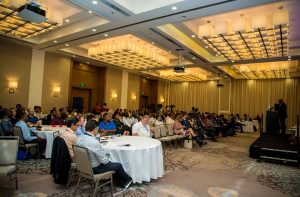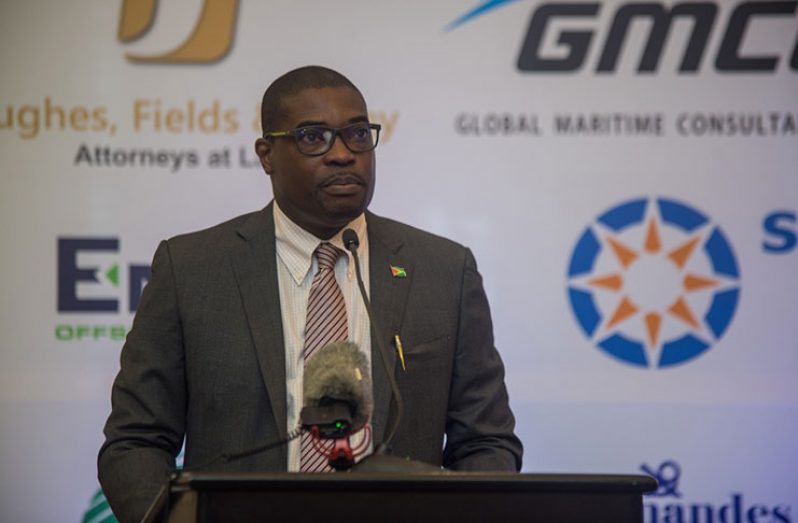IN view of the projected transformation, Guyana is preparing its maritime sector by revising and updating local laws and regulations to reflect the current realities of the emerging oil-and-gas sector.
“We must continue to employ good governance in the oil-and-gas sector through focused attention directed towards environmental concerns and protection of marine life,” said Public Infrastructure Minister, David Patterson.
He expressed these remarks at the Maritime Administration Department of Guyana (MARAD)’s Maritime Stakeholders’ Conference at the Marriott Hotel on Wednesday.
Oil and gas will be the primary engine of growth of the country for the next two decades. This has engendered an entirely new set of demands on maritime resources.
The current maritime legal and regulatory framework will have to be significantly upgraded and adapted to meet the new demands of the oil-and-gas industry.
MARAD, in recognition of the new challenges ahead, hosted the conference to provide an opportunity for local and international experts to participate in the creation of an entirely new, safe, modern and efficient maritime regime for Guyana.
Minister Patterson believes that it is not enough for Guyana to stand on the brink of a resource-rich future. He said the country must be prepared through the implementation of supporting legislative mechanisms with an ingrained safety culture.
Patterson said government will be planning for unforeseen circumstances through appropriate safety regulations to protect the populace.

Seafarers, he said, represent the true local persons who will encounter activities carried out offshore, so it is ultimately those officers who will serve to advance the maritime industry through the execution of their respective duties which would be grounded in safety, best practices and regulations.
“It is our men and women who will be the first responders, thereby emphasising capacity as we anticipate first-oil in 2020,” said Patterson.
In light of this, he believes that government must create a robust legal and regulatory framework to support development.
GAPS
Guyana recently received assistance to identify gaps and areas for continued improvement through audits, which were conducted by the International Maritime Organisation in 2018.
“We remain committed to addressing these issues to foster overall growth and advancement in the maritime landscape,” said Patterson.
In November 2018, Guyana also ratified 12 international treaties pertaining to development of the oil-and-gas industry.
As part of that process, 11 instruments were deposited at the International Maritime Organisation in February this year.
According to director of MARAD, Claudette Rogers, while they have made significant strides quite a lot needs to be done in relation to positioning of the department to respond to the demands and challenges which will stem from the fledgling oil-and-gas sector.
In addition to the ratification of international treaties, MARAD has also taken other steps to respond to the challenges in the sector.
Rogers said a consultant was hired to update Guyana’s maritime legislation. She said the consultant’s assignment has been complemented and the requisite recommendations will pave the way for a more robust system and consequential reduction in conflicts among agencies.
Regional Adviser of the IMO, Colin Young, congratulated Guyana for making positive strides, but urged the government to remember the importance of implementation in the process of safeguarding Guyana’s marine environment within which port state inspection plays a crucial role in ensuring that shipping takes place securely.
As a specialised agency of the United Nations, IMO is the global standard-setting authority for the safety, security and environmental performance of international shipping. Its main role is to create a regulatory framework for the shipping industry that is fair and effective, universally adopted and universally implemented.
In other words, its role is to create a level playing field, so that ship operators cannot address their financial issues by simply cutting corners and compromising on safety, security and environmental performance.
Young said countries must continue to address pressing safety and environmental concerns proactively and promote use of the latest technologies so that others do not find the need to impose inappropriate unilateral solutions on the industry. IMO has been assisting countries to build their capacity through technical cooperation.


.jpg)











